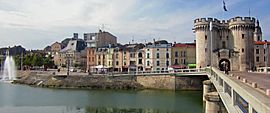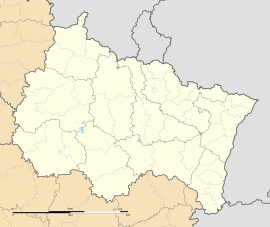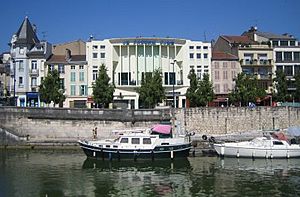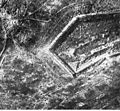Verdun facts for kids
Quick facts for kids
Verdun
|
||
|---|---|---|

La Porte Chaussée
|
||
|
||
| Country | France | |
| Region | Grand Est | |
| Department | Meuse | |
| Area
1
|
31.03 km2 (11.98 sq mi) | |
| Population
(2012)
|
18,327 | |
| • Density | 590.62/km2 (1,529.70/sq mi) | |
| Time zone | UTC+01:00 (CET) | |
| • Summer (DST) | UTC+02:00 (CEST) | |
| INSEE/Postal code |
55545 /55100
|
|
| Elevation | 194–330 m (636–1,083 ft) | |
| 1 French Land Register data, which excludes lakes, ponds, glaciers > 1 km2 (0.386 sq mi or 247 acres) and river estuaries. | ||
Verdun is a historic town in Lorraine, a region in northeastern France. Around 18,000 people live there. It is the main town of the Meuse department and sits on the Meuse River. Verdun has a very long and important history, especially known for its role in major European events. The city is also famous for its Dragées, which are special candies with almonds or anise seeds inside. The London Quai (Quai de Londres) is a street named to thank London, England, for helping to rebuild Verdun after World War I.
Contents
History of Verdun
Verdun has been an important place for thousands of years. It was a settlement even before the Romans arrived.
Early History and Treaties
Verdun was a key town in the Roman Empire. Later, in 843 AD, a very important agreement called the Treaty of Verdun was signed here. This treaty divided the large empire of Charlemagne into three parts. These parts eventually became the countries we know today as France, Germany, and Italy. This shows how central Verdun was in shaping early European nations.
Verdun in World War I
Verdun is most famous for the Battle of Verdun, which took place during World War I. This battle lasted for ten months in 1916. It was one of the longest and most brutal battles in human history.
The Battle of Verdun (1916)
The battle was fought between the French and German armies. Germany wanted to "bleed France white" by attacking Verdun, hoping to force France to use all its soldiers and resources. The fighting was incredibly intense, with millions of artillery shells fired. Soldiers lived in terrible conditions in trenches and underground forts.
Sacrifice and Remembrance
Both sides suffered huge losses, with hundreds of thousands of soldiers killed or wounded. The French army, led by General Philippe Pétain, bravely defended Verdun. The battle became a symbol of French courage and determination. Today, the area around Verdun is filled with memorials, cemeteries, and preserved battlefields. These sites help us remember the soldiers who fought and died there.
The Voie Sacrée
During the Battle of Verdun, one road was vital for supplying the French troops. This road, from Bar-le-Duc to Verdun, was named the Voie Sacrée (Sacred Way). Thousands of trucks constantly moved supplies and soldiers along it. Without this road, Verdun would have fallen. A memorial stands near Verdun to honor the men who kept this crucial supply line open.
Verdun Today
Today, Verdun is a peaceful town, but its history is still very much alive. Visitors come from all over the world to learn about the battle and pay their respects.
Local Culture and Economy
Verdun is known for its delicious dragées, which are often given as gifts at celebrations. The town also has a beautiful cathedral and a historic town hall. The Meuse River flows through the town, adding to its charm.
Images for kids
-
Charlemagne at the summit of Verdun's Victory Monument
See also
 In Spanish: Verdún para niños
In Spanish: Verdún para niños
 | Shirley Ann Jackson |
 | Garett Morgan |
 | J. Ernest Wilkins Jr. |
 | Elijah McCoy |

















